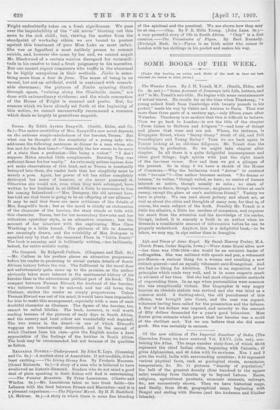SOME BOOKS OF THE WEEK.
[Under this heading ice notice such Books of the week as have not been reserved for review in other forms.] The Wander Years. By J. H. Yoxall, M.P. (Smith, Elder, and Co. Os. net.)—" Some Account of Journeys into Life, Letters, and Art" is Mr. Yoxall's sub-title. He begins with some reminiscences of actual travel. He recalls for us the time when Thackeray, "a young milord fresh from Cambridge with twenty pounds in his pocket," made his way by Calais and Amiens to Paris. That was more than three parts of a century ago,—only fifteen years after Waterloo. Thackeray is so modern that this is difficult to believe. Then we go back to London—is not the title of the chapter " From Calais to Holborn and Avignon" ?—and hear of things and places that were and are not. Where, for instance, is Kingsgate Street, where " Sairey Garnp " dwelt of old, and Poll Sweedlepipos and Young Bailey ? Then we are back again in France looking at an old-time diligence. Mr. Yoxall does the wandering to perfection. So we might take chapter after chapter. In all there is a quite delightful inconsequence and other good things; high spirits with just the right touch of the lacrimae reruns. Now and then we get a glimpse of the present. So in chap. 5 we have a sketch of the House of Commons.—Why the barbarous word "Aevus" in contrast with " Iuvenis" P—Our author becomes serious. "No drama so intense," he writes, "though veiled, as here; no centre of human interest so active, though usually so calm ; no clash of ambitions so fierce, though courteous ; no glance so bitter at one's enemy, except the glare at one's ambitious friend." Variety we have in plenty. We can road about pottery and about art, as well as about the cities and thoughts of many men, for that is, of course, the main subject of the book. Possibly Mr. Yoxall is a little too allusive, a little too careless of connexion, and requires too much from the attention and the knowledge of his reader, though, indeed, it is scarcely a fault in an author when lie demands a considerable amount of information before he can be properly understood. Anyhow, this is a delightful book,—to be taken, we may say, in sips rather than in draughts.






































 Previous page
Previous page